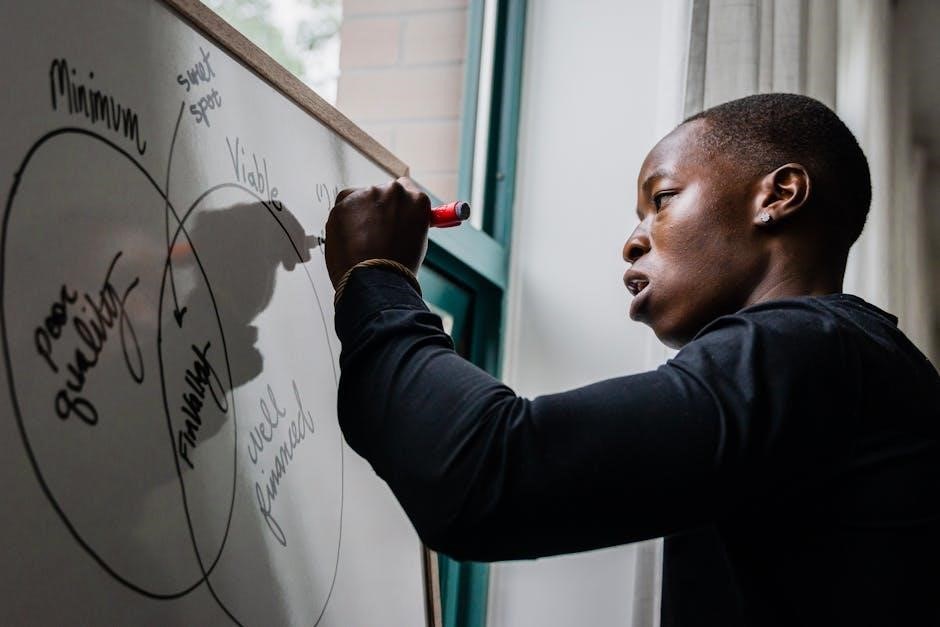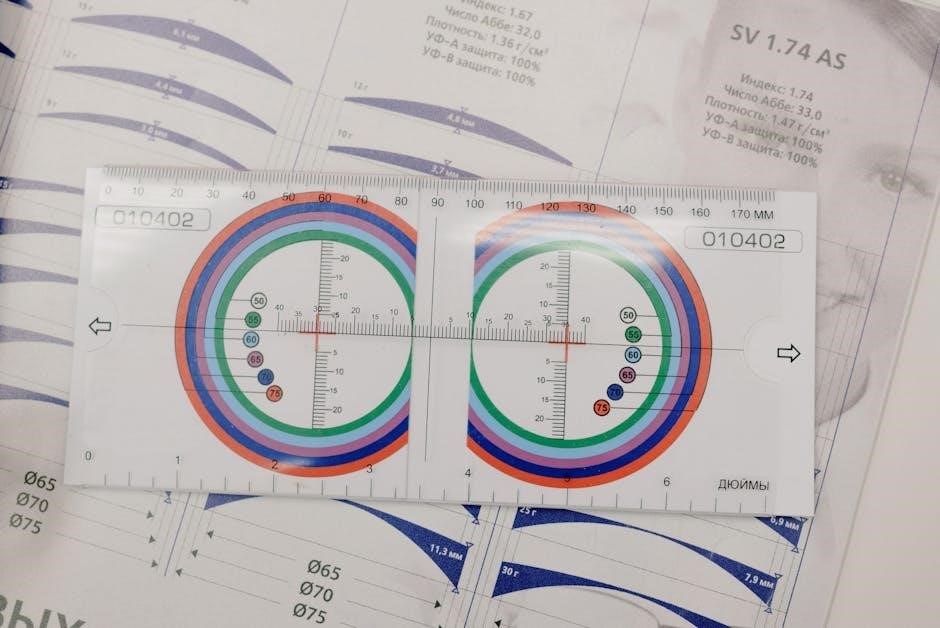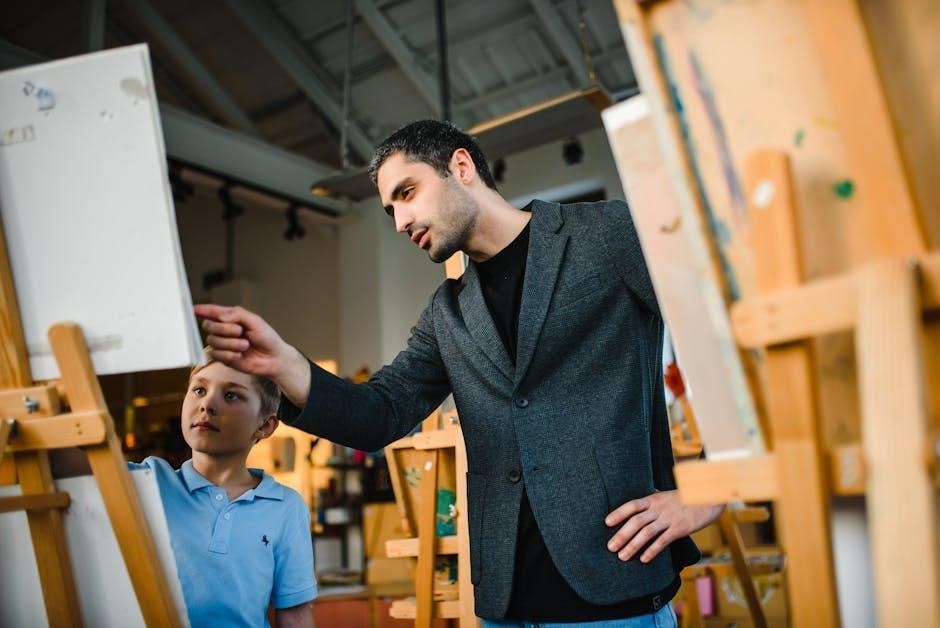instructional dean
An Instructional Dean plays a pivotal role in shaping academic excellence‚ overseeing curriculum development‚ and fostering faculty-student collaboration. Their leadership ensures educational quality and innovation‚ driving institutional success.

Role and Responsibilities of an Instructional Dean
An Instructional Dean oversees academic programs‚ leads curriculum development‚ and supports faculty growth. They manage budgets‚ ensure resource allocation‚ and foster student success through collaborative leadership and innovation.

Academic Leadership and Vision
An Instructional Dean provides visionary leadership to align academic goals with institutional missions. They foster a culture of innovation‚ ensuring programs stay relevant and meet evolving educational demands. By setting strategic priorities‚ deans guide faculty in achieving excellence. Their leadership promotes collaboration across departments‚ enhancing the academic environment. Effective communication of the vision ensures all stakeholders work toward common objectives‚ driving continuous improvement and adaptability in education.
Curriculum Development and Implementation
The Instructional Dean oversees curriculum development‚ ensuring it aligns with institutional goals and student needs. They collaborate with faculty to design innovative programs‚ assess educational outcomes‚ and implement updates. By leveraging evidence-based practices‚ deans ensure curricula remain relevant and effective. Their role includes facilitating stakeholder input‚ approving course changes‚ and monitoring implementation. Effective curriculum management enhances student learning experiences and institutional reputation. The dean’s leadership in this area fosters academic excellence‚ preparing students for future challenges while maintaining high educational standards.
Faculty Support and Professional Development
The Instructional Dean is instrumental in fostering faculty growth and professional development. They provide resources for continuous improvement‚ such as workshops‚ mentoring programs‚ and funding for conferences. Deans encourage collaboration among faculty members‚ promoting shared best practices and innovative teaching methods. By addressing challenges and offering support‚ they help faculty stay updated on educational trends and technologies. The Dean also advocates for faculty well-being‚ ensuring a positive academic environment. These efforts enhance teaching quality‚ student engagement‚ and overall institutional success‚ making the Instructional Dean a key figure in advancing faculty excellence and institutional reputation.

Key Challenges Faced by an Instructional Dean
An Instructional Dean faces challenges like limited budgets‚ maintaining faculty morale‚ and ensuring student success. These issues demand strategic planning and effective resource management to foster academic excellence.
Budget Constraints and Resource Allocation
Budget constraints and resource allocation are significant challenges for an Instructional Dean. Limited funding often requires difficult decisions to prioritize spending on faculty‚ curriculum‚ and student support. Deans must strategically allocate resources to meet institutional goals while addressing competing demands. This involves balancing investments in technology‚ faculty development‚ and student services‚ ensuring equitable access to opportunities. Effective financial planning and collaboration with stakeholders are essential to maximize limited budgets. By leveraging partnerships and grants‚ deans can mitigate budget shortfalls and maintain academic quality. Resource allocation decisions directly impact student success‚ making this a critical responsibility for Instructional Deans in fostering a thriving academic environment.
Maintaining Faculty Morale and Engagement
Maintaining faculty morale and engagement is crucial for an Instructional Dean to ensure a productive academic environment. This involves fostering open communication‚ recognizing contributions‚ and providing professional development opportunities. Deans must create an inclusive culture where faculty feel valued and supported. Addressing workload distribution and offering mental health resources can help reduce burnout. Encouraging collaboration among faculty members and celebrating achievements also boost morale. By prioritizing faculty well-being and engagement‚ Instructional Deans can create a motivated and committed team that drives student success and institutional growth. Strong leadership in this area ensures faculty remain inspired and dedicated to their roles and the institution’s mission.
Ensuring Student Success and Engagement
Ensuring student success and engagement is a cornerstone of an Instructional Dean’s responsibilities. This involves implementing strategies to improve academic outcomes‚ such as personalized learning plans and data-driven instruction. Deans work to create an inclusive environment that fosters student motivation and participation. They also collaborate with faculty to integrate innovative teaching methods that cater to diverse learning styles. Additionally‚ Deans advocate for resources like tutoring‚ mentorship programs‚ and mental health support to address barriers to student success. By prioritizing student engagement and well-being‚ Instructional Deans help students achieve their academic goals‚ preparing them for future challenges and fostering lifelong learning. This support directly impacts retention and graduation rates‚ ensuring students thrive academically and personally.

Strategies for Effective Instructional Leadership
Effective instructional leadership involves fostering collaboration‚ leveraging technology‚ and implementing innovative teaching methods to enhance learning outcomes and create a supportive academic environment for both students and faculty.
Building a Collaborative Academic Environment
An Instructional Dean fosters collaboration by promoting open communication and shared goals among faculty‚ staff‚ and students. They encourage cross-departmental teamwork‚ creating opportunities for joint projects and resource sharing. By building trust and inclusivity‚ they ensure diverse perspectives are valued. Regular meetings and workshops are organized to align visions and address challenges collectively. The dean also supports team-building activities to strengthen relationships and shared responsibility; Leveraging technology‚ they implement platforms for seamless communication and collaboration. This environment not only enhances academic outcomes but also prepares students for real-world teamwork. A collaborative culture is essential for innovation and sustained success in education.
Implementing Innovative Teaching Methods
An Instructional Dean drives educational innovation by promoting cutting-edge teaching strategies. They encourage faculty to adopt active learning techniques‚ integrate technology‚ and incorporate real-world applications into curricula. By fostering a culture of experimentation‚ deans support the use of flipped classrooms‚ hybrid learning models‚ and project-based instruction. They also facilitate professional development opportunities‚ such as workshops and training sessions‚ to equip educators with new skills. These efforts ensure students engage with dynamic‚ relevant content‚ preparing them for future challenges. Regular assessment of teaching methods ensures continuous improvement‚ aligning academic practices with evolving educational needs. Innovative teaching enhances student outcomes and institutional reputation‚ making it a key focus for instructional leaders.
Leveraging Technology for Enhanced Learning
An Instructional Dean plays a crucial role in integrating technology to enhance learning experiences. They promote the adoption of digital tools‚ such as learning management systems‚ online platforms‚ and interactive resources‚ to create engaging and accessible environments. By leveraging technology‚ deans ensure that faculty can deliver content flexibly‚ catering to diverse learning styles. They also advocate for the use of data analytics to track student progress and identify areas for improvement. Additionally‚ they support professional development programs to help educators effectively use technology in their teaching practices; This focus on technological integration not only enriches student learning but also prepares them for success in a digital-driven world‚ aligning with the dean’s commitment to fostering innovation and excellence in education.

Impact of an Instructional Dean on Student Success
An Instructional Dean significantly influences student success by fostering innovation‚ supporting strategic initiatives‚ and ensuring resources align with student needs‚ ultimately enhancing academic performance and personal growth.
Improving Student Retention Rates
An Instructional Dean plays a crucial role in improving student retention by aligning resources and strategies to meet student needs. By fostering a supportive academic environment‚ they help identify at-risk students early‚ providing interventions like mentorship and academic advising. Collaborating with faculty‚ the Dean ensures high-quality teaching methods and engaging curricula‚ which motivate students to persist. Data-driven approaches are used to monitor progress and adjust retention strategies‚ ensuring a culture of support and inclusivity. These efforts not only enhance retention but also promote overall student success and satisfaction‚ creating a lasting impact on academic achievement and personal growth.
Enhancing the Quality of Education
An Instructional Dean enhances educational quality by leading curriculum refinement and promoting innovative teaching methods. They collaborate with faculty to integrate evidence-based practices‚ ensuring courses remain relevant and engaging. By fostering a culture of continuous improvement‚ the Dean supports professional development opportunities for educators‚ enabling them to deliver high-quality instruction. Additionally‚ they advocate for resources and technologies that enrich the learning experience‚ ensuring students receive a well-rounded education. These efforts not only elevate academic standards but also prepare students to meet the demands of an evolving world‚ fostering intellectual growth and lifelong learning skills.
Preparing Students for Future Challenges
An Instructional Dean plays a crucial role in equipping students with skills to navigate future challenges. By fostering innovative teaching methods and integrating real-world applications‚ the Dean ensures curriculum relevance. They emphasize critical thinking‚ adaptability‚ and problem-solving‚ enabling students to thrive in dynamic environments. Collaborating with faculty‚ the Dean promotes experiential learning and technology-driven tools‚ preparing students for global demands. These efforts cultivate resilient‚ forward-thinking learners capable of addressing complex societal issues. Ultimately‚ the Dean’s strategic initiatives empower students to embrace lifelong learning and remain competitive in an ever-evolving world‚ ensuring they are well-prepared for future academic and professional endeavors.

The Future of the Instructional Dean Role
The Instructional Dean role is evolving to embrace innovation‚ technology‚ and strategic leadership in education‚ ensuring institutions adapt to changing demands and prepare students for future success effectively.
Evolving Role in Modern Education
The Instructional Dean’s role is transforming to meet modern educational demands. With a focus on innovation‚ deans now prioritize digital integration‚ fostering collaborative learning environments‚ and ensuring accessibility. They adapt to emerging teaching methods‚ leveraging technology to enhance student engagement and outcomes. Additionally‚ there is a growing emphasis on diversity‚ equity‚ and inclusion‚ requiring deans to implement policies that support all learners. By staying attuned to global trends and student needs‚ Instructional Deans are pivotal in shaping the future of education‚ ensuring institutions remain relevant and effective in preparing students for an ever-changing world.

Adapting to Technological Advancements
Instructional Deans are increasingly focused on integrating technology into education‚ ensuring institutions remain competitive. They oversee the adoption of digital tools‚ such as learning management systems and data analytics‚ to enhance teaching and student outcomes. Deans also prioritize faculty training to ensure educators are proficient in using these technologies. Additionally‚ they address challenges like budget constraints and equity in access to digital resources. By fostering a culture of innovation‚ Instructional Deans help bridge gaps between traditional and modern educational practices‚ ensuring students are prepared for a tech-driven future while maintaining academic excellence and accessibility for all learners.
Addressing Changing Educational Landscapes
Instructional Deans must navigate evolving educational trends‚ such as shifting student needs and demographic changes. They ensure curriculum remains relevant by incorporating diverse perspectives and modern skills. Deans also address policy changes and accreditation requirements‚ maintaining institutional compliance. By fostering collaboration with faculty‚ students‚ and community stakeholders‚ they create adaptive learning environments. Additionally‚ they prioritize student-centered approaches to cater to varying learning styles and prepare learners for global challenges. Through strategic planning and continuous improvement‚ Instructional Deans ensure their institutions remain responsive to educational shifts‚ fostering innovation and equity while upholding academic integrity and excellence.
The role of an Instructional Dean is pivotal in shaping educational excellence and fostering institutional growth. By providing academic leadership‚ supporting faculty development‚ and prioritizing student success‚ Instructional Deans ensure that educational institutions remain relevant and effective. They navigate challenges such as budget constraints and evolving educational landscapes while maintaining a focus on innovation and collaboration. Their efforts create a supportive and inclusive learning environment‚ ultimately preparing students for future challenges. The impact of an Instructional Dean extends beyond academics‚ influencing the broader educational community. Their dedication to continuous improvement and student-centered approaches underscores their critical role in modern education.
